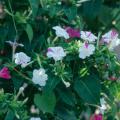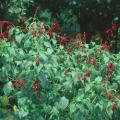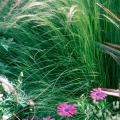News From 2002
MISSISSIPPI STATE -- Without any improvement in rice prices this year, growers depend more on government support and are hoping the quality and quantity of the 2002 crop will make a big difference in their bottom lines.
By Norman Winter
MSU Horticulturist
Central Mississippi Research & Extension Center
Many people are looking at tired gardens in the late summer and fall, but Miss Ann is a friend near Terry, Miss., who will tell you it's time for Mississippians to enjoy four o'clocks for their beauty and their fragrance.
MISSISSIPPI STATE -- Two Mississippi State University researchers created a worst-case scenario to see what impact Mississippi's declining apparel industry could have on the state.
Darren Hudson and Stan Spurlock used an input-output economic model called IMPLAN to play the "what-if" game. They looked at what the complete loss of the apparel industry would do to the country.
MISSISSIPPI STATE -- Mississippi State University researchers are looking for the best of both worlds as they evaluate the benefits and risks of two types of fescue when consumed by broodmares.
MISSISSIPPI STATE -- Recent fluctuations in the poultry export market don't affect the price farmers get for growing broilers under contract, but they are having an impact on the poultry companies' bottom lines.
Tim Chamblee, Mississippi Agricultural and Forestry Experiment Station associate professor of poultry science, said the poultry industry is holding its own this year, although exports of broiler meat were down 21 percent the first quarter of this year compared to 2001.
MISSISSIPPI STATE -- The fight to prevent West Nile Virus will likely be won on a personal level, with individual protection being the best defense against the disease.
James Jarratt, entomologist with Mississippi State University's Extension Service, said the West Nile Virus, a type of encephalitis, is being transmitted primarily by the Southern house mosquito, a Culex species found statewide.
HATTIESBURG -- South Mississippi cattle producers are counting on (market) strength in numbers as well as the quality of their heifers to bring a more satisfying experience for buyers and sellers alike at an upcoming sale.
With the aid of Mississippi State University's Extension Service, a group of about 20 cattle producers are planning a bred and open heifer sale in the Jones County multipurpose arena, known as the Magnolia Center, at noon on Aug. 31.
By John Hawkins
MISSISSIPPI STATE -- Flies with larvae that burrow into the skulls of their prey may seem like characters in a science-fiction movie, but the phorid fly is actually one of the newest tools being used to counter the spread of imported fire ant populations in the Southeast.
By Norman Winter
MSU Horticulturist
Central Mississippi Research & Extension Center
When I say you need some fiber, I'm not talking about bran flakes for breakfast. If you love tropical plants as much as I do, you have got to try the Japanese fiber banana in your landscape.
Even though it is a tropical, gardeners on the Tennessee border can grow this cold-hardy banana species. The plant is known botanically as Musa basjoo. The banana gets about 10 feet tall and adds great interest to the landscape.
MISSISSIPPI STATE -- Discipline is one of the most important tools for parents' as they teach and guide children to become moral, independent adults.
Louise Davis, child and family development specialist with Mississippi State University's Extension Service, said discipline comes from the word "disciple," which means a follower, and does not necessarily involve punishment.
By John Hawkins
VERONA -- North Mississippi residents with horticultural questions and the volunteers who help them will benefit from new software that keeps records on callers to a popular gardening hotline.
Master Gardeners at Mississippi State University's North Mississippi Research and Extension Center will use the program developed and donated by Miguel Guerreiro, a Tupelo Internet consultant.
MISSISSIPPI STATE -- Corn borers are inspiring growers to harvest corn as soon as possible, but producers must carefully weigh their decisions based on grain moisture content.
Erick Larson, corn specialist with Mississippi State University's Extension Service, said high populations of southwestern corn borers in the Delta and northeast Mississippi will cause substantial harvest losses if the corn is not harvested promptly. Growers can harvest corn after it reaches physiological maturity, which occurs when the grain measures about 30 percent moisture.
MISSISSIPPI STATE -- With zero boll weevils in 98 percent of Mississippi's cotton fields, growers appear eager to continue the eradication program that has brought them this far.
By Norman Winter
MSU Horticulturist
Central Mississippi Research & Extension Center
They say, "seeing is believing," but in the case of Salvia van houttei, seeing is wanting, whether you are a hungry hummingbird or a gardener with an eye for color.
MISSISSIPPI STATE -- Researchers at Mississippi State University who are trying to formulate the best diet for catfish have found a protein mix that seems to be the most efficient.
Protein is added to catfish diets from either plant or animal sources. Catfish need protein for the same reasons every other living thing needs protein -- bodies cannot make certain amino acids needed to function and must get these from food.
MISSISSIPPI STATE -- West Nile Virus made its first appearance in the state in 2001, and Mississippians will likely need to take precautions from it for many years to come.
After entering the northeast United States in 1999, West Nile Virus made its first appearance in Mississippi's bird and horse populations in 2001. This year, it has recurred in those animal populations and is taking a human toll as well. No deaths are expected in other species, such as dogs or cats.
MISSISSIPPI STATE -- Weather conditions in 2002 may be much better than in recent years for Mississippi's sod producers, but the market challenges are not getting any easier.
Wayne Wells, turfgrass specialist with Mississippi State University's Extension Service, said reasonable amounts of rain have reduced irrigation expenses and some of the management challenges this year.
By Norman Winter
MSU Horticulturist
Central Mississippi Research & Extension Center
Fountain, maiden and muhly grasses are among the most popular ornamental grasses, but watch for the new kid on the block, Mexican feather grass. The Mexican feather grass, known botanically as Stipa tenuissima, will bring an entirely new look to the garden.
JACKSON -- Mississippi is one step closer to having one of the nation's premier exhibitions of 4-H memorabilia and interactive programs after the July 20 groundbreaking for the Pete Frierson Mississippi 4-H Museum in Jackson.
MISSISSIPPI STATE -- Mississippi avoided an epidemic of southern pine beetles last year, but a recent survey found epidemic numbers of the beetles in national forests in south Mississippi.
Pages
News Types
- Crop Report (424)
- Feature Story (5886)
- Feature Photo (53)
- Extension Outdoors (318)
- Southern Gardening (1469)
- Extension Inbox (95)
Archive
- 2025 (61)
- 2024 (186)
- 2023 (182)
- 2022 (183)
- 2021 (176)
- 2020 (211)
- 2019 (222)
- 2018 (276)
- 2017 (336)
- 2016 (381)
- 2015 (456)
- 2014 (495)
- 2013 (487)
- 2012 (491)
- 2011 (354)
- 2010 (320)
- 2009 (313)
- 2008 (272)
- 2007 (263)
- 2006 (252)
- 2005 (278)
- 2004 (270)
- 2003 (279)
- 2002 (227)
- 2001 (238)
- 2000 (241)
- 1999 (231)
- 1998 (231)
- 1997 (239)
- 1996 (58)
- 1995 (36)




